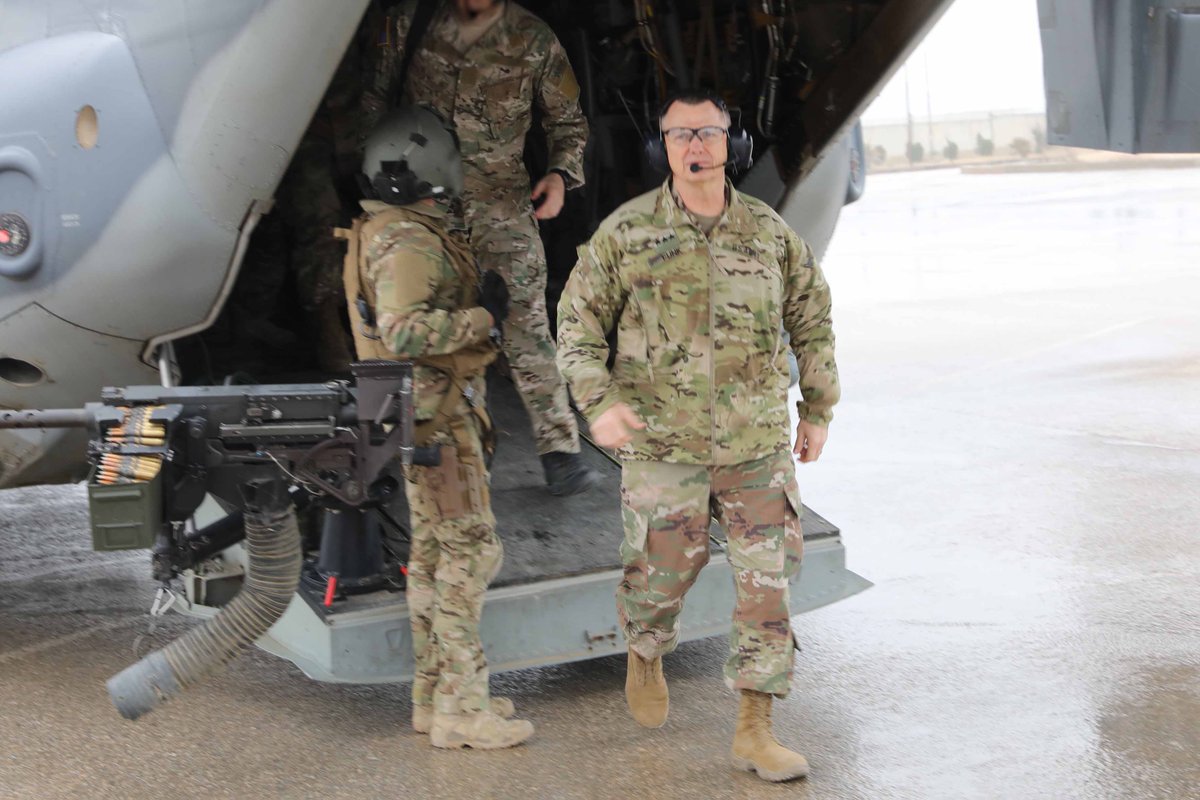By Rudaw
Cargo is off loaded from a US Air Force C-130 Hercules at an undisclosed location in Syria on February 06, 2018. Photo: Tech. Sgt. Gregory Brook | US Air Force
ERBIL, Kurdistan Region – The US military has up to 20 bases on Syrian territories controlled by Kurdish forces, an official from the Russian Security Council has claimed, according to Russian media.
Alexander Venediktov, an aide to Security Council Secretary Nikolai Patrushev, told Russian news agency RIA Novosti that Washington has been supplying its Kurdish allies with advanced weapons.
The Kurdish-led People’s Protection Units (YPG), which form the backbone of the US-backed Syrian Democratic Forces (SDF), deny receiving heavy weapons from the Americans.
The US presence in Syria has been branded “illegal” by Damascus and its major military backers Russia and Iran. Turkey has also called for the United States to pull out of northern Syria, even threatening open confrontation with American forces in the city of Manbij, where the United States has a small but significant military presence.
US officials say they are retaining troops in Rojava for post-ISIS stabilization efforts. Reported estimates suggest there are up to 3,000 US troops in the country.
“The principal reason we are in Syria is to defeat ISIS,” said General Joseph Votel. “That remains our single task. Part of defeating ISIS is removing the control of the physical terrain and ensuring that they cannot resurge.”
ISIS rose to power in Syria in late 2013 before spreading into Iraq.
Alexander Venediktov, an aide to Security Council Secretary Nikolai Patrushev, told Russian news agency RIA Novosti that Washington has been supplying its Kurdish allies with advanced weapons.
The Kurdish-led People’s Protection Units (YPG), which form the backbone of the US-backed Syrian Democratic Forces (SDF), deny receiving heavy weapons from the Americans.
The US presence in Syria has been branded “illegal” by Damascus and its major military backers Russia and Iran. Turkey has also called for the United States to pull out of northern Syria, even threatening open confrontation with American forces in the city of Manbij, where the United States has a small but significant military presence.
US officials say they are retaining troops in Rojava for post-ISIS stabilization efforts. Reported estimates suggest there are up to 3,000 US troops in the country.
The commander of CENTCOM testified to the US Congress on Tuesday. He was asked on what grounds the United States has a force presence in Syria.
“The principal reason we are in Syria is to defeat ISIS,” said General Joseph Votel. “That remains our single task. Part of defeating ISIS is removing the control of the physical terrain and ensuring that they cannot resurge.”
ISIS rose to power in Syria in late 2013 before spreading into Iraq.
“Our part of being there was largely driven by the self-defense of Iraq…” Votel stated. “ISIS has been an organization that did not adhere to sovereign boundaries, and why we cannot address ISIS in Iraq without addressing ISIS in Syria” pointing out that the Syrian regime “is unwilling and unable to address this particular threat.”
US Lt. General Paul E. Funk II, the anti-ISIS coalition commander for Iraq and Syria, publicized his presence at an undisclosed location in Syria on Wednesday.
In January it emerged the US was planning to build a 30,000-strong SDF-led border-guard force along the Turkish border with Syria. The Syrian regime, Iran, Russia and Turkey alleged the United States was planning to partition Syria.
In mid-February, Russian Foreign Minister Sergei Lavrov said Washington is arming and supporting militia groups fighting for Kurdish autonomy in northern Syria for its own geopolitical aims.
“Obviously, the United States has some strategy, which, I think, is geared to keep its military presence in Syria forever,” Russia’s top diplomat told Euronews.
“They [the US] seem to be seeking to alienate a vast part of Syrian territory from the rest of the country in violation of Syria’s sovereignty and territorial integrity,” he said. “They are forming quasi-local authorities in a bid to establish a Kurd-based autonomy there.”
On February 7, an attempt by approximately 500 paramilitaries — both Iranian-trained militias and suspected Russian contractors using tanks — attacked an SDF base in Deir ez-Zor province. An unspecified number were killed in a counterattack.
Russian foreign ministry Spokeswoman Maria Zakharova lambasted the United States on February 15 by alleging its presence in southeastern al-Tanf is aimed at protecting remnants of ISIS. She also described the events of February 7 as “defiant actions” which brought Washington “close to an open confrontation with the Syrian army.”
In mid-February, Russian Foreign Minister Sergei Lavrov said Washington is arming and supporting militia groups fighting for Kurdish autonomy in northern Syria for its own geopolitical aims.
“Obviously, the United States has some strategy, which, I think, is geared to keep its military presence in Syria forever,” Russia’s top diplomat told Euronews.
“They [the US] seem to be seeking to alienate a vast part of Syrian territory from the rest of the country in violation of Syria’s sovereignty and territorial integrity,” he said. “They are forming quasi-local authorities in a bid to establish a Kurd-based autonomy there.”
On February 7, an attempt by approximately 500 paramilitaries — both Iranian-trained militias and suspected Russian contractors using tanks — attacked an SDF base in Deir ez-Zor province. An unspecified number were killed in a counterattack.
Russian foreign ministry Spokeswoman Maria Zakharova lambasted the United States on February 15 by alleging its presence in southeastern al-Tanf is aimed at protecting remnants of ISIS. She also described the events of February 7 as “defiant actions” which brought Washington “close to an open confrontation with the Syrian army.”

Comments
Post a Comment